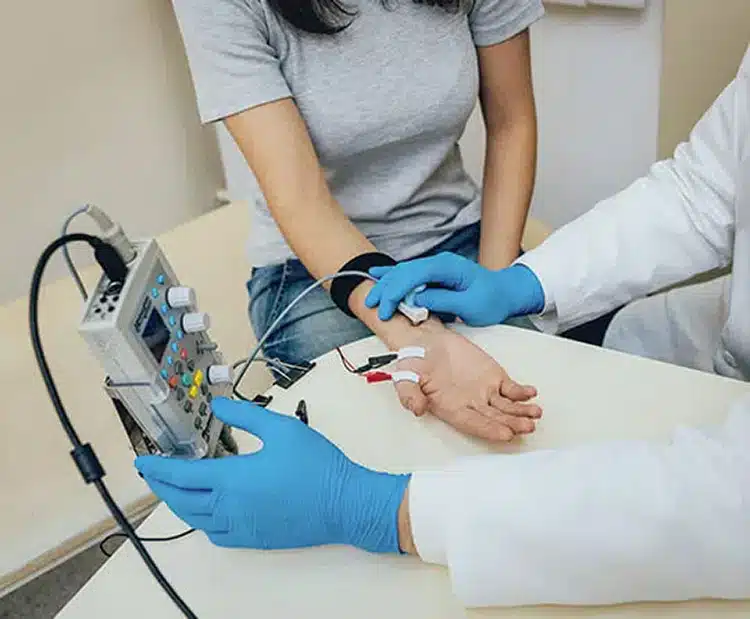
WHAT IS AN EMG?
Electrodiagnostic medicine is the study of diseases of the nerves and muscles. Your physician has recommended a Nerve conduction study and/or EMG test to determine if your muscles and nerves are working as they should. The results of the tests will help your doctor decide what is wrong and what management plan is most appropriate.
Types of Tests
* Nerve Conduction Studies: These determine if the body’s electrical signals are traveling to a nerve properly. This is performed by applying small electrical shocks to the nerve and then recording how the nerve works. These shocks are transient and cause a mild tingling feeling. In order to determine the location and degree of nerve impairment, the doctor may test several nerves.
* Needle EMG: For this study, a small, thin needle is quickly inserted into various muscles to assess for muscle injury. A brand-new, sterile needle is used for each patient and quickly discarded after the test. You may experience a mild and brief poking sensation when the needle is inserted. Our team will test only the muscles necessary to decide what is wrong and if there are any patterns of abnormalities that determine the cause of the problem. There are no limitations or restrictions on activities prior to or after an EMG. Acetaminophen or an ice pack can be used to relieve any minor irritation and soreness if necessary.
Why did your physician recommend an NCS/EMG for you?
You are having an NCS/EMG because you have experienced symptoms of numbness, tingling, pain, weakness, or muscle cramping.
How should I prepare for the test?
Let us know if you are taking any blood thinners, have a pacemaker, or have hemophilia. Abstain from body lotion on the day of the test as this may affect the quality of the study. If you have Myasthenia gravis, ask your doctor if you should take your regular medications before the test.
How long does a test take?
The tests usually take 20 to 90 minutes, but varies widely based on the indication. You can do any of your normal activities as you would otherwise, including eating, driving, and exercising, before the tests and after the tests. There are no lasting side effects.
When will I know the test results?
If a consult request is included in your referral, the EMG doctor will see you right after the test is performed to discuss your test results with you. If the study is for an NCS/EMG only, these will be sent to your primary care doctor. After the study is completed, make an appointment with the doctor who sent you for the test to discuss the next steps in your management.
What kind of medical training do doctors who do EMGs have?
Doctors who have EMGs as part of their practice go to 4 years of medical school then have 5-6 years more years of training in a residency program. Most work as neurologists or physical medicine and rehabilitation doctors. We are a board-certified neurology practice with additional subspecialty board-certification in electrodiagnostic medicine from the American Board of Electrodiagnostic Medicine (ABEM)
